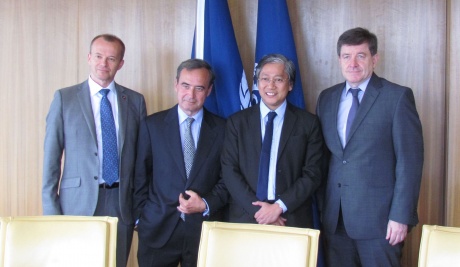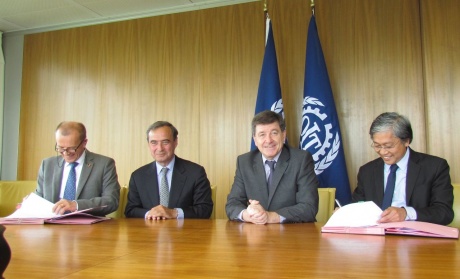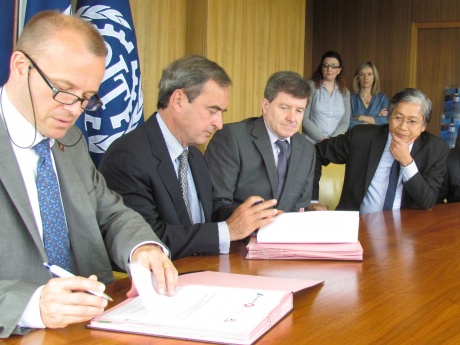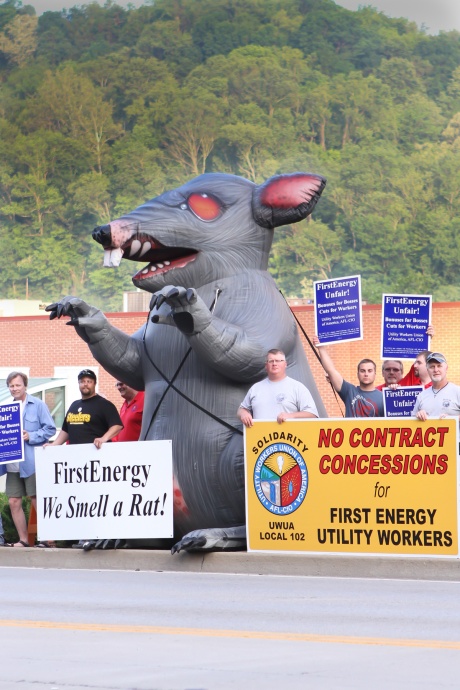| IndustriALL Headlines are produced by IndustriALL Global Union |
Global brands pull together on Bangladesh safety deal
May 23, 2013 – Major retail companies behind the global Bangladesh Fire and Safety Accord showed their commitment to improving the lives of Bangladeshi garment workers at the kick-off meeting, held at the International Labour Organisation in Geneva today.
The companies alongside IndustriALL Global Union and UNI Global Union agreed to immediately move forward with implementing the Accord. The aim is to have safety inspectors on the ground as quickly as possible in order to begin to fix the most urgent problems.
The participants, including the Clean Clothes Campaign and the Worker Rights Consortium who have signed as witnesses to the agreement, said that the Accord was an opportunity to rectify the unacceptable risks currently faced by Bangladeshi garment workers because of poor standards on factory safety.
More than 1,100 people died in the Rana Plaza building collapse, Bangladesh’s largest industrial tragedy, sparking a worldwide debate on how to improve safety.
IndustriALL General Secretary Jyrki Raina said:
“This is standard setting work from the over 40 founding signatory clothing brands of the legally binding Accord with IndustriALL Global Union and UNI Global Union. Workers everywhere will now seek to expand this historic Accord to other countries and to other industrial sectors. We are invigorated to work with this critical mass of market leading clothing brands and retailers to turn the sentiments of the Accord into reality in Bangladesh.”
UNI Global Union General Secretary, Philip Jennings said:
“It is time to roll up our sleeves and get on with the urgent task of improving factory safety in Bangladesh.”
Work is now beginning on the implementation phase of the Accord.
Here is the list of companies who have signed the Bangladesh Fire and Safety Accord:
COMPANY SIGNATORIES:
Abercrombie & Fitch
Marks and Spencer
Aldi North
Aldi South
Benetton
Bonmarche
C&A
Carrefour
Charles Vögele
Comtex
El Corte Inglés
Ernstings’s Family
Esprit
Fat Face
G-star
H&M
Hema
Inditex
jbc
John Lewis
Kik
Lidl
Loblaw
Mango
Mothercare
N Brown
New Look
Next
Otto Group
Primark
PVH
s.Oliver
Stockmann
Switcher
Tchibo
Tesco
V&D
We Europe
Contacts:
Tom Grinter, IndustriALL, Mobile: +41 79 693 44 99, TGrinter@industriALL-Union.org
Richard Elliott, UNI Global Union, Mobile: +41 79 794 9709, richard.elliott@uniglobalunion.org
Industry controlled Responsible Jewellery Council fails to fulfill promise
May 22, 2013 – Industry controlled Responsible Jewellery Council (RJC) fails to fulfill promise of preventing conflict diamonds and dirty gold. Trade unions and environmental groups team up to expose deep flaws in jewelry certification system.
Washington, D.C., Ottawa, Geneva, Sydney, 22 May 2013 – In a new report, More Shine Than Substance: How RJC certification fails to create responsible jewelry, an international coalition of labor and environmental groups indict the Responsible Jewellery Council (RJC)’s certification system as misleading jewelry consumers. The RJC holds its annual meeting in Milan on 23 May.
“Jewelry is meant to lift our spirits. But it loses its value if it’s made with gold or diamonds that are tarnished by human rights abuses or environmental destruction,”
said Earthworks’ No Dirty Gold campaign director Payal Sampat. She continued,
“Unfortunately, RJC’s certification cannot reassure consumers that the gems and precious metals that pass through its system did not come at the cost of community health or clean water.”
The groups releasing More Shine Than Substance include the trade union federation, IndustriALL Global Union, which represents 50 million workers globally, CFMEU Australia, United Steelworkers, and environmental advocacy groups Earthworks and MiningWatch Canada.
More Shine Than Substance documents how the RJC’s certification system offers little in the way of real solutions to the serious human rights, labor and environmental problems that caused RJC’s formation. The RJC Board of Directors consists exclusively of industry representatives, with no representatives from impacted communities, labor, or environmental organizations. This exclusion is in sharp contrast to other, more robust, certification systems such as the Forest Stewardship Council.
“RJC can’t polish the image of gold and diamonds while keeping worker and community representatives off the table,”
said Jyrki Raina, General Secretary of IndustriALL Global Union in Geneva.
“Having the industry set its own standards and certify compliance is rather like having the fox guard the henhouse. How can the public have faith in such a process?”
In the wake of campaigns targeting dirty gold and conflict diamonds, and media exposés of the true environmental and social costs of these minerals, jewelry companies recognized that their brands and reputations were at risk. In response a coalition of jewelry trade associations, retailers, and their suppliers, including mining companies, formed the Responsible Jewellery Council.
“If RJC is going to let its member companies claim “responsible business practices” for the corporation as a whole then all their operations should adhere to RJC standards,”
said Ken Neumann, National Director of the United Steelworkers in Canada.
Companies like Rio Tinto can’t be RJC-certified as a whole, while remaining a principal investor in mines like Grasberg in Indonesia that don’t meet RJC standards.
The Steelworkers represent workers at several Rio Tinto operations in the U.S. and Canada. In 2012, Rio Tinto locked out 780 Steelworker members in Canada for six months.
The RJC system is riddled with loopholes relating to membership, auditing, and accountability, allowing, for example, member companies as a whole to be certified as RJC compliant even when some of their gold, platinum and diamond-producing facilities — or projects they are invested in — are excluded from RJC audits. The system lacks transparency. Auditors’ reports are not made public, and equally troubling, the RJC itself doesn’t receive evidence or detailed auditors’ reports about operations that it certifies.
Several RJC standards are weak and violate widely accepted social and environmental principles. Under the RJC Code, mining companies can operate in conflict zones, fail to protect workers’ rights to join unions, and allow children as young as 14 to work. It also fails to place limits on water and air pollution and allows toxic waste disposal into lakes and ocean environments.
“Communities living near mines are fighting to protect their health, livelihoods, social and cultural values that are threatened by mining,”
said Catherine Coumans of MiningWatch Canada.
“Their efforts are undermined by the RJC system that certifies the continuation of the status quo,”
she added.
“The RJC system does not drive the fundamental change that is needed.”
The report compares RJC’s flaws to that of industry-defined and controlled certification systems in other sectors, such as the Sustainable Forestry Initiative (SFI), which has come under heavy criticism from green groups. In contrast, the Forest Stewardship Council, which embraces multi-stakeholder governance and strong standards, is widely considered a more robust and credible system for certifying sustainable wood products.
“Without significant improvements, the RJC system risks tarnishing, rather than burnishing, the reputations of its member companies,”
added Payal Sampat of Earthworks. .
Contacts:
Payal Sampat, Earthworks, 202-247-1180, earthworksaction.org
Joe Drexler, United Steelworkers, 416-434-7907, usw.ca
Catherine Coumans, MiningWatch Canada, 613-569-3439, miningwatch.ca
Cherisse Fredericks, IndustriALL, +41-22 -308-5023, industriall-union.org
Sustainable Industrial Policy launch
May 17, 2013 – IndustriALL is launching an ambitious initiative on Sustainable Industrial Policy which aims to stimulate debate and action among affiliates and so promote a union perspective on the key sustainability issues for industry.
IndustriALL represents 50 million workers worldwide in extractive, manufacturing and processing industries. The future sustainability of these industries depends on governments making strategic choices. Trade unions have a crucial role to play in working with governments and business to ensure that our present industries are sustainable, that decent, new, greener jobs are created, and that human rights and the environment are respected and protected in the process.
“As trade unions, we need to develop our own vision of how our industries and jobs should be transformed to meet sustainability goals. We must also be able to identify the policy levers that may be used to implement that vision. That is why with our Sustainable Industrial Policy initiative we are taking an integrated approach that recognizes the role of technology, labour standards, social standards, environmental imperatives, trade agreements and the urgent need for governments to formulate progressive industrial policy’ said General Secretary Jyrki Raina. ‘Sustainability is the goal – industrial policy is the route we use to get there.
Based on IndustriALL’s ten point Action Plan, endorsed by affiliates at its founding Congress, the Sustainable Industrial Policy initiative will include:
A first regional meeting on sustainable industrial development has already taken place in sub-Saharan Africa. Affiliates agreed to focus on developing union capacity to demand comprehensive and strategic industrial policies, educating members and raising public awareness to campaign for policies that benefit working people, and developing joint policies for specific industries. Affiliates also agreed to mobilize their members regionally on Africa Industrialization Day in November.
IndustriALL is releasing a discussion paper to kick-start the global initiative on sustainability by providing background on the key issues to be taken into account. It builds on the goals identified in the IndustriALL Action Plan to:
‘I hope that affiliates will use the discussion paper to drive debate among their members on a strategic union approach to Sustainable Industrial Policy’ said Jyrki Raina. ‘We cannot leave decisions about the future of our industries, our jobs and our planet to multinational companies and market forces. Through IndustriALL we can make the voice of industrial workers heard.’
Global unions renew agreement with Lafarge
On 21 May 2013 IndustriALL, Building and Wood Workers’ International (BWI) and Lafarge Group re-confirmed their global framework agreement GFA.
 |
 |
 |
This new agreement promotes Lafarge’s commitment to international fundamental labour rights, recognizes the principles expressed in the UN Guiding Principles on business and human rights and upholds best practices regarding union rights and social dialogue.
The new redaction has a substantially improved language regarding respect by the company of the core International Labour Organization Conventions 87 and 98 on freedom of association and collective bargaining, settlement of disputes as well as application of the agreement across the company’s subsidiaries and supplier chain. A special group consisting of the representatives of signatories will meet at least once a year to follow up and review the implementation of the agreement.
The new Global Agreement also reinforces Lafarge actions in fields like health and safety or diversity thanks to new statements and a direct reference to the Group strategy with its “2020 Ambitions” on sustainable development.
The signing ceremony took place in the ILO headquarters in Geneva, Switzerland in presence of the ILO Director General Guy Ryder. Bruno Lafont, Lafarge Chairman and CEO signed the agreement on behalf of the Lafarge Group, the signatories from the union side were Jyrki Raina, IndustriALL General Secretary and Ambet Yuson, BWI General Secretary.
BWI General Secretary Ambet Yuson states that “especially the commitments of Lafarge to apply agreed standards in its subcontractors and the commitment of the company and its subcontractors for direct employment are beyond those of its competitors and therefore standard setting for the cement industry”.
IndustriALL’s General Secretary, Jyrki Raina, states that for IndustriALL Global Union, “the provisions in the renewed agreement represent significant improvements for workers and trade unions, especially the provisions on freedom of association, subcontractors and the settlement of disputes. It is crucial to improve social dialogue between trade unions and management for the betterment of living and working conditions for cement workers across the world”.
Lafarge Chairman and CEO, Bruno Lafont expressed his satisfaction regarding this new agreement: “This agreement highlights the constant and positive dialogue between the Group and the Global Union Federations. It illustrates the coherence of our actions with our values in all our countries of operations”. Lafarge is the world leader in building materials, holds top-ranking positions in all three of its activities: Cement, Aggregates & Concrete. Lafarge employs 65,000 people in 64 countries.
The text of the press release is available on the link http://www.industriall-union.org/bwi-industriall-global-union-and-lafarge-sign-a-new-global-framework-agreement.
 |
US Utility Workers protest CEO’s pay
Some 300 angry union members of the Utility Workers Union of America (UWUA) and their allies within the West Virginia AFL-CIO protested outside the Annual General Meeting of FirstEnergy, the US’s third largest electric power company.
The 21 May demonstration in Morgantown, West Virginia, signalled both worker and community discontent toward the firm’s contemptible executive pay practices at the same time it attempts to extract concessions from workers and set in place slower response times for electric consumers.
The UWUA represents some 3,800 workers at FirstEnergy, a privatized utility serving 6 million customers in five US states. The company is an amalgamation of some 10 regional power companies over the last dozen or so years, and its corporate strategy as it bargains with UWUA has been to reduce work and living standards to the very lowest possible, across the board.
Last year, FirstEnergy’s board of directors awarded CEO Tony Alexander a total compensation package of US$ 23.3 million, 27% more than the US$18.3 million he took in 2011 even though corporate revenue and earnings sharply declined. FirstEnergy relies primarily on coal-fired generation units although it does operate 3 nuclear facilities.
UWUA’s eight branch unions have committed to one another to block the company’s plunge to the bottom strategy as it bargains co-ordinately in separate collective agreements over the next few years. Tuesday’s demonstration was accompanied by a handful of trade union resolutions inside the company’s meeting calling on FirstEnergy and its managers to curb executive greed.
UWUA System Local 102 is currently bargaining with FirstEnergy at the former Allegheny Energy complex of companies, a 2011 addition to the Akron, Ohio-based firm that expanded FirstEnergy by a third. Besides seeking work-rule and benefits concessions to the detriment of 1,000 union members, company negotiators want elimination of a consumer-friendly “customer service” clause in Local 102’s contract that would result in longer delays for workers to respond to emergency service restorations.
The UWUA did win a US$1.25 million backpay settlement from FirstEnergy for 150 power plants workers in Harrison, West Virginia. The award came after the company was found in violation of the US National Labor Relations Act, following a successful organizing drive at the power plant. FirstEnergy and UWUA Local 304 are now in talks for a first collective agreement there, while Local 180 in Pennsylvania now begins negotiations with the company in a union strategy aimed at coordination of all bargaining.
UWUA’s ballot initiative at FirstEnergy’s annual meeting was showcased as part of the AFL-CIO’s Executive PayWatch.